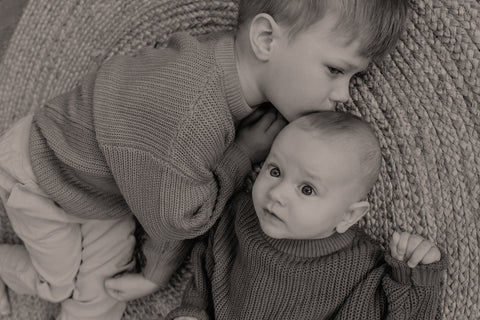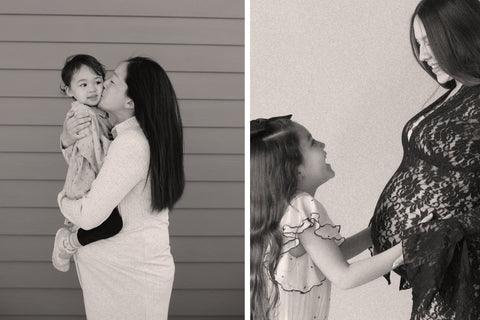April 10, 2024parenting
Preparing your child for a new sibling

Having a new baby in the family can be both exciting and challenging for big brothers and sisters. Though you may be thrilled to have a second child on the way, your older child may not see it as all upside and might be anxious about the change to family life. Reassuring them will help set their minds at ease but we all know that babies aren't easy and it may be even harder if older siblings are struggling with the transition. Preparing your eldest and helping them feel included in the process can go a long way to a smooth and happy family life.
Depending on the age difference between your children and the new sibling, there are some rules of thumb that experts recommend for creating the best possible family environment.
Involve them
When your toddler feels involved throughout your pregnancy, it will likely be an easier adjustment for them once the baby arrives as they have already adjusted to life with a new sibling. Invite them to help you prepare for the baby’s arrival, sorting the nursery or picking any new clothes or other baby items.
You can also help them by involving them in decision making. By asking them who they want to stay with while you’re in hospital having the baby (Grandparents? Cousins?) or where do they want to meet the baby, maybe they want to come to the hospital and meet them straight away, or would prefer to be at home. You can give them some of the more fun to-dos as well, how about letting your older child choose a nickname for their baby sibling?
Realistic expectations
Try to explain as best you can, the reality of what it will be like once the new baby arrives. How often they’ll sleep, need feeding, a nappy change. If your child seems engaged, you can make this into play by role playing what it will be like at home, maybe preparing baby bottles or nappy changes, whatever they’re most intrigued by. There are also loads of story books that help prepare an older child for a new brother or sister.
Your child may also enjoy learning about what they were like as a baby and this will help educate them about what having a baby around might be like. Or if you have a friend or family with a new baby, you could take them on a visit to give them some real life hands-on experience.

Introduce them
During pregnancy, encourage your child to interact with their new sibling, this can be talking to them, singing them a nursery rhyme, or even reading their favourite book. Once your baby starts to move around you can invite your older child to feel when the baby moves and kicks, this will surely be an exciting time for them too and help to make it all feel a bit more ‘real’.
You could also try asking them what the baby wants, for example "Do you think the baby wants a lie down?" Hopefully they’ll say "Yes" and you get a much needed rest.
Be patient & plan
Some regression in your toddler’s behaviour is to be expected as it's a life changing adjustment for them. Try to minimise change by moving them into their new bedroom, or starting them at nursery a good few months before the baby arrives so it's already a normal part of their routine and they are settled by the time baby arrives. Also think about possibly delaying things like potty training so they (and you) don’t have the stress of doing this with a newborn.
Try to make the first meeting as calm as possible, don’t put too much pressure on the moment and let them lead the initial interaction, if they want to hold the baby etc. As well as making sure your toddler is well fed and rested, to hopefully avoid any bad moods or tantrums.
No doubt they will adjust and begin to adore their younger sibling, it just might take some time. So once the baby arrives try to carve out some quality time for your eldest, whether it's popping out for a hot chocolate while your partner is looking after the baby or just playing their favourite game during nap time. Let them know they are still just as cherished.
If you want to learn more, Child Mind Institute have broken down the best way to help prepare children of different ages, read more here.










































